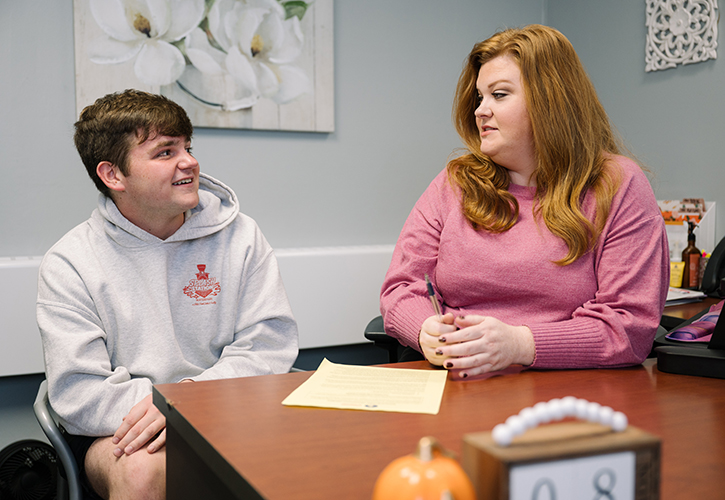Sociology, Anthropology and Social Work
What is sociology?
Sociology is the scientific study of how social forces influence human behavior and social outcomes, and how human interaction shapes institutions, organizations, and society more broadly. Sociologists are especially interested in better understanding the causes and consequences of our collective social problems - for example, racism, sexism, poverty, and crime. Faculty in our department adhere to the mission of the American Sociological Association, which calls on sociologists to advance science for the common good and promote the advancement of human rights.
Sociologists study a broad range of human behaviors, cultures, and organizations. Sociology faculty at the University of Dayton have specialized knowledge across variety of fields, including:
- Community and Urban Sociology
- Crime and Deviance
- Environmental Sociology
- Gender, Sex, and Sexualities
- Health, Aging, and the Lifecourse
- Human Rights
- Internet/Online Community
- Immigration and Immigrant Communities
- Law and Society
- Marriage, Family, and Children
- Political Sociology
- Race and Ethnicity
- Research Methods
- Social Inequalities and Systems of Oppression
- Social Movements and Social Change
- Sociology of Music
- Sociology of Religion
- Visual Sociology
From the American Sociological Association
This video highlights the unique contributions of sociology to the understanding of today’s most divisive issues, sixteen sociologists speak briefly to the need for and impact of their field.
From the American Sociological Association
This video highlights the unique contributions of sociology to the understanding of today’s most divisive issues, sixteen sociologists speak briefly to the need for and impact of their field.

At UD, most students come to sociology because they want to gain a deeper understanding of the people and world around them in order to make the world a better place. Through the support of our award-winning faculty, we help our students do both. We offer two paths of study: a Bachelor of Arts in Sociology and a Minor in Sociology. Our program is known for high levels of interaction between faculty and students and collegial mentorship relationships.

Our program provides numerous opportunities for independent and supervised research, experiential learning, internships, and unique course offerings that allow undergraduate students to advance their knowledge, develop practical skills, and test their career interests at an early stage in their academic development. Studying Sociology at UD not only allows students to develop valuable social science knowledge, skills, and perspective, but invaluable applied experience, and a greater insight on what it means to be human in contemporary society.
What's great about sociology at UD?
Current majors describe their experiences.
What's great about sociology at UD?
Current majors describe their experiences.
Where do we go from here?
The sociology major includes seven required courses, plus six elective courses. Three elective courses can be in anthropology or social work, and many students choose to add a minor in one of these areas. The sociology major culminates with students designing, conducting, and presenting the results of their own independent research project.
Required Courses:
- Principles of Sociology, to learn the basic foundation of sociology;
- Research Methods, where students learn how to gather data and evaluate research;
- Data Analysis, where students learn how to analyze qualitative and quantitative data;
- Urban Sociology, in which students explore sociological concepts in the Dayton community;
- Social Theory, to learn the frameworks for understanding social concepts;
- Senior Project Design, where students formulate a research question and design; and
- Senior Capstone, in which students conduct their own research, analyze data, and present their findings in public and written formats.
Electives:
Elective courses represent a wide range of sociological topics and faculty expertise. Most double count for requirements under the Common Academic Program. Majors can choose from the full catalog of available classes, or may select one of four Elective Pathways to guide their course selection. Elective Pathways include:
- Identities and Relationships: for human beings, it’s all about relationships. These courses explore universal themes and diverse experiences of family, gender, sexuality, and age as they impact our lives.
- Institutions and Inequalities: power is everywhere, and it impacts us all differently. These courses look at issues of justice and access for different people and social groups within many different social institutions.
- Sustainability, Social Change, and Place: place and community are important, and many of us spend our lives trying to make the places we live better. These courses explore ways to create sustainable and equitable communities.
- Law, Society, and Justice: society is shaped by legal frameworks, and by the human practices that create, interpret, and enact law. These courses explore dynamics between legal systems and the human experience.
The sociology minor requires that students take fifteen hours of sociology courses, at least twelve hours of which are at the 300 or 400 level. This is a highly customizable option for students in all majors, as many sociology courses double count for requirements in the Common Academic Program.
Sociology students learn to analyze social problems, understand the role of social structure, culture, and context, gather and analyze data to draw conclusions about social phenomena, and clearly communicate social science knowledge through various forms, including images, writing, and speech. These analytical, research and communications skills are highly desirable in today’s fast-paced, fluid and global job market.
The strength of a degree in sociology is that rather than limit you to a single, narrow career track, our program provides you with the knowledge and skills to prepare you for careers and opportunities in a variety of fields, or for advanced degrees in graduate and professional programs.
Our recent graduates have used their sociological training to go on to careers or programs of study in such fields as:
- Law
- Government and public administration
- Social work
- Education
- International development
- Community organizing and development
- Non-profit management
- Human/social services
- Criminal justice
- Public health
- Business and marketing
The American Sociological Association’s brochure “Sociology, a 21st Century Major” lists the following ways that Sociology will give you the tools to navigate the changing world:
- Conduct research and analyze data. In Sociology you use both qualitative and quantitative research methods. Learn to recognize trends and patterns and produce social statistics such as those used in market research, opinion polling, program evaluation, sales and countless other applications.
- Communicate skillfully. Learn how to convey your ideas effectively in writing and in presentations. Strong communication skills are essential for success in the 21st century.
- Practice critical thinking. Learn to look beyond the surface of issues to discover the “why.” Build your analytical skills. Solve problems and identify opportunities.
- Gain a global perspective. Learn about different cultures and how to analyze the interaction of groups and societies through a global and historical perspective.
- Prepare for graduate school. An undergraduate major in sociology provides an excellent foundation for graduate study in a wide range of fields including law, business, social work, medicine, public health, public administration and, of course, sociology.
